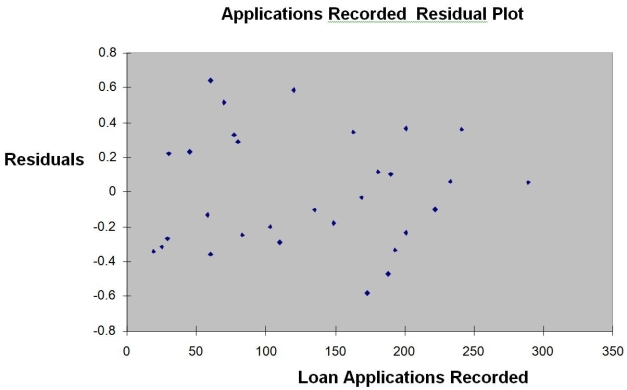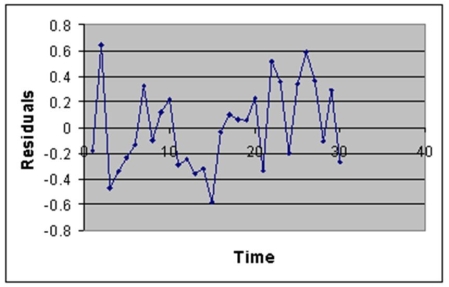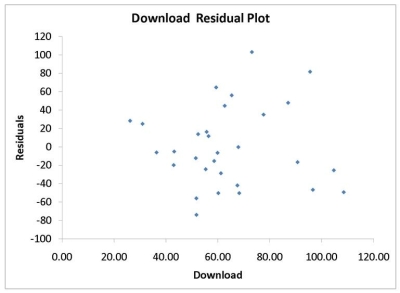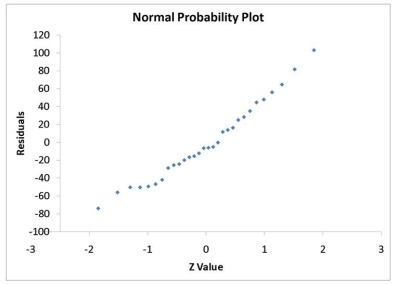Exam 13: Simple Linear Regression
Exam 1: Introduction145 Questions
Exam 2: Organizing and Visualizing Data210 Questions
Exam 3: Numerical Descriptive Measures153 Questions
Exam 4: Basic Probability171 Questions
Exam 5: Discrete Probability Distributions218 Questions
Exam 6: The Normal Distribution and Other Continuous Distributions191 Questions
Exam 7: Sampling and Sampling Distributions197 Questions
Exam 8: Confidence Interval Estimation196 Questions
Exam 9: Fundamentals of Hypothesis Testing: One-Sample Tests165 Questions
Exam 10: Two-Sample Tests210 Questions
Exam 11: Analysis of Variance213 Questions
Exam 12: Chi-Square Tests and Nonparametric Tests201 Questions
Exam 13: Simple Linear Regression213 Questions
Exam 14: Introduction to Multiple Regression355 Questions
Exam 15: Multiple Regression Model Building96 Questions
Exam 16: Time-Series Forecasting168 Questions
Exam 17: Statistical Applications in Quality Management133 Questions
Exam 18: A Roadmap for Analyzing Data54 Questions
Select questions type
TABLE 13-13
In this era of tough economic conditions, voters increasingly ask the question: "Is the educational achievement level of students dependent on the amount of money the state in which they reside spends on education?" The partial computer output below is the result of using spending per student ($) as the independent variable and composite score which is the sum of the math, science and reading scores as the dependent variable on 35 states that participated in a study. The table includes only partial results.
Regression Statistics Multiple R 0.3122 R Square 0.0975 Adjusted R 0.0701 Square Standard 26.9122 Error Observations 35
df SS MS F Regression 1 2581.5759 Residual 724.2674 Total 34 26482.4000
Coefficients Standard Error t Stat P-value Intercept 595.540251 22.115176 Spending per Student () 0.007996 0.004235
-Referring to Table 13-13, the decision on the test of whether composite score depends linearly on spending per student using a 10% level of significance is to ________ (reject or not reject)H₀.
(Short Answer)
4.7/5  (37)
(37)
TABLE 13-10
The management of a chain electronic store would like to develop a model for predicting the weekly sales (in thousands of dollars) for individual stores based on the number of customers who made purchases. A random sample of 12 stores yields the following results:
Customers Sales (Thousands of Dollars) 907 11.20 926 11.05 713 8.21 741 9.21 780 9.42 898 10.08 510 6.73 529 7.02 460 6.12 872 9.52 650 7.53 603 7.25
-Referring to Table 13-10, construct a 95% confidence interval for the mean weekly sales when the number of customers who make purchases is 600.
(Essay)
4.9/5  (37)
(37)
The sample correlation coefficient between X and Y is 0.375. It has been found out that the p-value is 0.256 when testing H₀: ρ = 0 against the two-sided alternative H₁: ρ ≠ 0. To test H₀: ρ = 0 against the one-sided alternative H₁: ρ > 0 at a significance level of 0.1, the p-value is
(Multiple Choice)
4.7/5  (31)
(31)
TABLE 13-12
The manager of the purchasing department of a large saving and loan organization would like to develop a model to predict the amount of time (measured in hours) it takes to record a loan application. Data are collected from a sample of 30 days, and the number of applications recorded and completion time in hours is recorded. Below is the regression output:
Regression Statistics Multiple R 0.9447 R Square 0.8924 Adjusted R 0.8886 Square Standard 0.3342 Error Observations 30
df SS MS F Significance F Regression 1 25.9438 25.9438 232.2200 4.3946-15 Residual 28 3.1282 0.1117 Total 29 29.072
Coefficients Standard Error t Stat P -value Lower 95\% Upper 95\% Intercept 0.4024 0.1236 3.2559 0.0030 0.1492 0.6555 Applications Recorded 0.0126 0.0008 15.2388 4.3946-15 0.0109 0.0143
Note: 4.3946E-15 is 4.3946*10^-15

 -Referring to Table 13-12, predict the amount of time it would take to process 150 invoices.
-Referring to Table 13-12, predict the amount of time it would take to process 150 invoices.
(Short Answer)
4.8/5  (25)
(25)
TABLE 13-4
The managers of a brokerage firm are interested in finding out if the number of new clients a broker brings into the firm affects the sales generated by the broker. They sample 12 brokers and determine the number of new clients they have enrolled in the last year and their sales amounts in thousands of dollars. These data are presented in the table that follows. 1 27 52 2 11 37 3 42 64 4 33 55 5 15 29 6 15 34 7 25 58 8 36 59 9 28 44 10 30 48 11 17 31 12 22 38
-Referring to Table 13-4, ________ % of the total variation in sales generated can be explained by the number of new clients brought in.
(Short Answer)
4.7/5  (36)
(36)
TABLE 13-4
The managers of a brokerage firm are interested in finding out if the number of new clients a broker brings into the firm affects the sales generated by the broker. They sample 12 brokers and determine the number of new clients they have enrolled in the last year and their sales amounts in thousands of dollars. These data are presented in the table that follows. 1 27 52 2 11 37 3 42 64 4 33 55 5 15 29 6 15 34 7 25 58 8 36 59 9 28 44 10 30 48 11 17 31 12 22 38
-Referring to Table 13-4, the standard error of estimate is ________.
(Short Answer)
4.8/5  (25)
(25)
TABLE 13-11
A computer software developer would like to use the number of downloads (in thousands) for the trial version of his new shareware to predict the amount of revenue (in thousands of dollars) he can make on the full version of the new shareware. Following is the output from a simple linear regression along with the residual plot and normal probability plot obtained from a data set of 30 different sharewares that he has developed:
Regression Statistics Multiple R 0.8691 R Square 0.7554 Adjusted R Square 0.7467 Standard Error 44.4765 Observations 30.0000
df SS MS F Significance F Regression 1 171062.9193 171062.9193 86.4759 0.0000 Residual 28 55388.4309 1978.1582 Total 29 226451.3503
Coefficients Standard Error t Stat P-value Lower 95\% \multicolumn 1 r Upper 95\% Intercept -95.0614 26.9183 -3.5315 0.0015 -150.2009 -39.9218 Download 3.7297 0.4011 9.2992 0.0000 2.9082 4.5513

 -Referring to Table 13-11, which of the following assumptions appears to have been violated?
-Referring to Table 13-11, which of the following assumptions appears to have been violated?
(Multiple Choice)
5.0/5  (27)
(27)
The Regression Sum of Squares (SSR)can never be greater than the Total Sum of Squares (SST).
(True/False)
4.7/5  (30)
(30)
The sample correlation coefficient between X and Y is 0.375. It has been found out that the p-value is 0.256 when testing H₀: ρ = 0 against the one-sided alternative H₁: ρ > 0. To test H₀: ρ = 0 against the two-sided alternative H₁: ρ ≠ 0 at a significance level of 0.1, the p-value is
(Multiple Choice)
4.7/5  (25)
(25)
TABLE 13-3
The director of cooperative education at a state college wants to examine the effect of cooperative education job experience on marketability in the work place. She takes a random sample of 4 students. For these 4, she finds out how many times each had a cooperative education job and how many job offers they received upon graduation. These data are presented in the table below. Student CoopJobs JobOffer 1 1 4 2 2 6 3 1 3 4 0 1
-Referring to Table 13-3, the prediction for the number of job offers for a person with 2 coop jobs is ________.
(Short Answer)
4.7/5  (38)
(38)
TABLE 13-10
The management of a chain electronic store would like to develop a model for predicting the weekly sales (in thousands of dollars) for individual stores based on the number of customers who made purchases. A random sample of 12 stores yields the following results:
Customers Sales (Thousands of Dollars) 907 11.20 926 11.05 713 8.21 741 9.21 780 9.42 898 10.08 510 6.73 529 7.02 460 6.12 872 9.52 650 7.53 603 7.25
-Referring to Table 13-10, what are the values of the estimated intercept and slope?
(Short Answer)
4.8/5  (33)
(33)
TABLE 13-12
The manager of the purchasing department of a large saving and loan organization would like to develop a model to predict the amount of time (measured in hours) it takes to record a loan application. Data are collected from a sample of 30 days, and the number of applications recorded and completion time in hours is recorded. Below is the regression output:
Regression Statistics Multiple R 0.9447 R Square 0.8924 Adjusted R 0.8886 Square Standard 0.3342 Error Observations 30
df SS MS F Significance F Regression 1 25.9438 25.9438 232.2200 4.3946-15 Residual 28 3.1282 0.1117 Total 29 29.072
Coefficients Standard Error t Stat P -value Lower 95\% Upper 95\% Intercept 0.4024 0.1236 3.2559 0.0030 0.1492 0.6555 Applications Recorded 0.0126 0.0008 15.2388 4.3946-15 0.0109 0.0143
Note: 4.3946E-15 is 4.3946*10^-15

 -Referring to Table 13-12, to test the claim that the mean amount of time depends positively on the number of loan applications recorded against the null hypothesis that the mean amount of time does not depend linearly on the number of invoices processed, the p-value of the test statistic is
-Referring to Table 13-12, to test the claim that the mean amount of time depends positively on the number of loan applications recorded against the null hypothesis that the mean amount of time does not depend linearly on the number of invoices processed, the p-value of the test statistic is
(Multiple Choice)
4.9/5  (35)
(35)
TABLE 13-10
The management of a chain electronic store would like to develop a model for predicting the weekly sales (in thousands of dollars) for individual stores based on the number of customers who made purchases. A random sample of 12 stores yields the following results:
Customers Sales (Thousands of Dollars) 907 11.20 926 11.05 713 8.21 741 9.21 780 9.42 898 10.08 510 6.73 529 7.02 460 6.12 872 9.52 650 7.53 603 7.25
-Referring to Table 13-10, what is the value of the F test statistic when testing whether the number of customers who make purchases is a good predictor for weekly sales?
(Short Answer)
4.8/5  (35)
(35)
TABLE 13-9
It is believed that, the average numbers of hours spent studying per day (HOURS) during undergraduate education should have a positive linear relationship with the starting salary (SALARY, measured in thousands of dollars per month) after graduation. Given below is the Excel output for predicting starting salary (Y) using number of hours spent studying per day (X) for a sample of 51 students. NOTE: Only partial output is shown.
Regression Statistics Multiple R 0.8857 R Square 0.7845 Adjusted R Square 0.7801 Standard Error 1.3704 Observations 51
df SS MS F Significance F Regression 1 335.0472 335.0473 178.3859 Residual 1.8782 Total 50 427.0798
Standard Coefficients Error t Stat P-value Lower 95\% Upper 95\% Intercept -1.8940 0.4018 -4.7134 2.051-05 -2.7015 -1.0865 Hours 0.9795 0.0733 13.3561 5.944-18 0.8321 1.1269
Note: 2.051E - 05 = 2.051*10⁻⁰⁵ and 5.944E - 18 = 5.944*10⁻¹⁸.
-Referring to Table 13-9, the error sum of squares (SSE)of the above regression is
(Multiple Choice)
4.9/5  (39)
(39)
The Chancellor of a university has commissioned a team to collect data on students' GPAs and the amount of time they spend bar hopping every week (measured in minutes). He wants to know if imposing much tougher regulations on all campus bars to make it more difficult for students to spend time in any campus bar will have a significant impact on general students' GPAs. His team should use a t test on the slope of the population regression.
(True/False)
4.9/5  (26)
(26)
TABLE 13-8
It is believed that GPA (grade point average, based on a four point scale) should have a positive linear relationship with ACT scores. Given below is the Excel output for predicting GPA using ACT scores based a data set of 8 randomly chosen students from a Big-Ten university.
Regression Statistics Multiple R 0.7598 R Square 0.5774 Adjusted R Square 0.5069 Standard Error 0.2691 Observations 8
df SS MS F Significance F Regression 1 0.5940 0.5940 8.1986 0.0286 Residual 6 0.4347 0.0724 Total 7 1.0287
Coefficients Standard Error t Stat P-value Lower 95\% Upper 95\% Intercept 0.5681 0.9284 0.6119 0.5630 -1.7036 2.8398 ACT 0.1021 0.0356 2.8633 0.0286 0.0148 0.1895
-Referring to Table 13-8, what is the predicted value of GPA when ACT = 20?
(Multiple Choice)
4.8/5  (44)
(44)
TABLE 13-4
The managers of a brokerage firm are interested in finding out if the number of new clients a broker brings into the firm affects the sales generated by the broker. They sample 12 brokers and determine the number of new clients they have enrolled in the last year and their sales amounts in thousands of dollars. These data are presented in the table that follows. 1 27 52 2 11 37 3 42 64 4 33 55 5 15 29 6 15 34 7 25 58 8 36 59 9 28 44 10 30 48 11 17 31 12 22 38
-Referring to Table 13-4, the standard error of the estimated slope coefficient is ________.
(Short Answer)
4.8/5  (30)
(30)
TABLE 13-11
A computer software developer would like to use the number of downloads (in thousands) for the trial version of his new shareware to predict the amount of revenue (in thousands of dollars) he can make on the full version of the new shareware. Following is the output from a simple linear regression along with the residual plot and normal probability plot obtained from a data set of 30 different sharewares that he has developed:
Regression Statistics Multiple R 0.8691 R Square 0.7554 Adjusted R Square 0.7467 Standard Error 44.4765 Observations 30.0000
df SS MS F Significance F Regression 1 171062.9193 171062.9193 86.4759 0.0000 Residual 28 55388.4309 1978.1582 Total 29 226451.3503
Coefficients Standard Error t Stat P-value Lower 95\% \multicolumn 1 r Upper 95\% Intercept -95.0614 26.9183 -3.5315 0.0015 -150.2009 -39.9218 Download 3.7297 0.4011 9.2992 0.0000 2.9082 4.5513

 -Referring to Table 13-11, what is the standard error of estimate?
-Referring to Table 13-11, what is the standard error of estimate?
(Short Answer)
4.8/5  (35)
(35)
TABLE 13-12
The manager of the purchasing department of a large saving and loan organization would like to develop a model to predict the amount of time (measured in hours) it takes to record a loan application. Data are collected from a sample of 30 days, and the number of applications recorded and completion time in hours is recorded. Below is the regression output:
Regression Statistics Multiple R 0.9447 R Square 0.8924 Adjusted R 0.8886 Square Standard 0.3342 Error Observations 30
df SS MS F Significance F Regression 1 25.9438 25.9438 232.2200 4.3946-15 Residual 28 3.1282 0.1117 Total 29 29.072
Coefficients Standard Error t Stat P -value Lower 95\% Upper 95\% Intercept 0.4024 0.1236 3.2559 0.0030 0.1492 0.6555 Applications Recorded 0.0126 0.0008 15.2388 4.3946-15 0.0109 0.0143
Note: 4.3946E-15 is 4.3946*10^-15

 -Referring to Table 13-12, there is a 95% probability that the mean amount of time needed to record one additional loan application is somewhere between 0.0109 and 0.0143 hours.
-Referring to Table 13-12, there is a 95% probability that the mean amount of time needed to record one additional loan application is somewhere between 0.0109 and 0.0143 hours.
(True/False)
4.8/5  (36)
(36)
Showing 21 - 40 of 213
Filters
- Essay(0)
- Multiple Choice(0)
- Short Answer(0)
- True False(0)
- Matching(0)